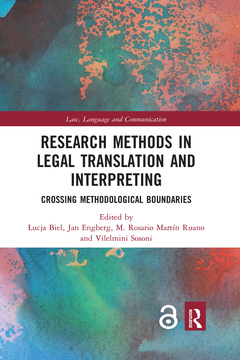Research Methods in Legal Translation and Interpreting Crossing Methodological Boundaries Law, Language and Communication Series
Coordonnateurs : Biel Łucja, Engberg Jan, Martín Ruano Rosario, Sosoni Vilelmini

The field of Legal translation and interpreting has strongly expanded over recent years. As it has developed into an independent branch of Translation Studies, this book advocates for a substantiated discussion of methods and methodology, as well as knowledge about the variety of approaches actually applied in the field. It is argued that, complex and multifaceted as it is, legal translation calls for research that might cross boundaries across research approaches and disciplines in order to shed light on the many facets of this social practice. The volume addresses the challenge of methodological consolidation, triangulation and refinement. The work presents examples of the variety of theoretical approaches which have been developed in the discipline and of the methodological sophistication which is currently being called for. In this regard, by combining different perspectives, they expand our understanding of the roles played by legal translators and interpreters, who emerge as linguistic and intercultural mediators dealing with a rich variety of legal texts; as knowledge communicators and as builders of specialised knowledge; as social agents performing a socially-situated activity; as decision-makers and agents subject to and redefining power relations, and as political actors shaping legal cultures and negotiating cultural identities, as well as their own professional identity.
Chapter 2 of this book is freely available as a downloadable Open Access PDF at http://www.taylorfrancis.com under a Creative Commons Attribution-Non Commercial-No Derivatives (CC-BY-NC-ND) 4.0 license.
Introduction to Research Methods in Legal Translation and Interpreting: Crossing Methodological Boundaries 1. Corpus methods in Legal Translation Studies 2. Implications of text categorisation for corpus-based legal translation research: the case of international institutional settings 3. Inverse legal translation: a corpus-driven study of multi-word units related to the structure of translated statutory provisions 4. Language of treaties – language of power relations? 5. Explicitation in Legal Translation: A Feature of Expertise? A Study of Spanish-Danish Translation of Judgments 6. Critical Discourse Analysis and the investigation of the interpreter's own positioning in a court hearing. A case study from an Austrian criminal court 7. How to apply comparative law to legal translation. A new 3-step juritraductological translating approach to legal texts 8. A matter of justice: integrating comparative law methods into the decision-making process in legal translation 9. A mixed-methods approach in Corpus-Based Interpreting Studies: quality of interpreting in criminal proceedings in Spain 10. An online survey as a means to research the ‘outstitutional’ legal translation market 11. Interviewing legal interpreters and translators: framing status perceptions and interactional and structural power
Łucja Biel is Associate Professor and Head of Corpus Research Centre at the Institute of Applied Linguistics, University of Warsaw, Poland, where she teaches and researches legal translation. She is Secretary General of the European Society of Translation Studies (EST) and deputy editor of the Journal of Specialised Translation . She has participated in a number of internationally and nationally funded research projects on legal and institutional translation. Her research interests focus on legal/EU translation, legal terminology, translator training
and corpus linguistics. She has published over 50 papers in this area, e.g. in The Translator, Meta. The Translators’ Journal, The Interpreter and Translator Trainer, Fachsprache, LANS-TTS and a book Lost in the Eurofog. The Textual Fit of Translated Law (Peter Lang, 2014).
Jan Engberg, PhD is Professor of Knowledge Communication at the School of
Communication and Culture, University of Aarhus, Denmark. He teaches legal
as well as fi nancial translation at BA and MA level, as well as other branches of
text oriented foreign language skills. His main areas of research interest are the
study of translation and mediation of knowledge in the fi eld of law, texts and
genres in the academic fi eld, cognitive aspects of domain-specifi c discourse and
the relations between specialised knowledge and text formulation as well as basic
aspects of communication in domain-specifi c settings. His research focus is upon
communication and translation in the fi eld of law. He is editor-in-chief of the
international journal Fachsprache and member of the editorial or advisory boards
of a substantial number of international scholarly journals.
M. Rosario Martín Ruano is Associate Professor at the University of
Salamanca, Spain, where she is a member of the Research Group on Translation,
Ideology and Culture and where she
Date de parution : 12-2020
15.6x23.4 cm
Date de parution : 05-2019
15.6x23.4 cm
Thèmes de Research Methods in Legal Translation and Interpreting :
Mots-clés :
BIC Score; End User Licence Agreements; Legal Translation Studies; Interpreting; Research Methods; Comparative Law; Online Survey Approach; legal interpretion; Comparable Monolingual Corpora; legal translation; CJEU Judgment; methodological eclectism; EU Text; Finnish-Soviet treaties; comparative law; FCMA Treaty; LTS; Parallel Corpus; International Public Law; Inverse Translation; Bilingual Parallel Corpus; Corpus Methods; Complex Preposition; Target Legal Systems; Legal Language; Oral Corpus; Phraseological Units; Lexical Bundles; Comparative Law Methodology; Editing Unit; Translation Expertise; Elliptical Phrases; Comparable Corpora



